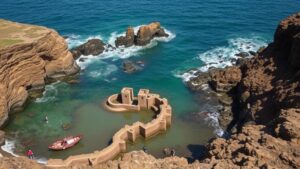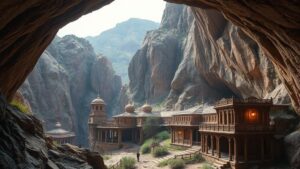Investigating the existence of Koloneia, an ancient Byzantine city lost in Asia Minor.
Investigating the Existence of Koloneia: An Ancient Byzantine City Lost in Asia Minor
Koloneia, a name not frequently echoed in the annals of history, represents an intriguing piece of our ancient world. This Byzantine city, believed to be nestled in what is now known as Asia Minor, has captured the attention of historians and archaeologists alike. Despite its significant past, the exact location and remains of Koloneia remain shrouded in mystery, demanding a closer examination.
Historical Context of Koloneia
Koloneia is often referenced in ancient texts as a Byzantine city with a rich cultural and economic life. Located in proximity to the region known as Cappadocia, the city flourished from around the 4th to the 15th centuries AD. During this period, it served both as a military stronghold and a thriving hub for trade routes that connected Europe and Asia.
Archaeological evidence suggests that Koloneia was influential in the Byzantine ecumenical councils, which played a crucial role in developing early Christian doctrine. The city was likely home to numerous religious structures and monasteries, which contributed to its prominence during the Byzantine Empires zenith.
Archaeological Discoveries and Theories
Despite numerous references in ancient texts, Koloneia has evaded definitive identification. Various archaeological expeditions have been conducted in the Cappadocia region, but the search has yielded mixed results. Some researchers propose that Koloneia may be located in present-day Kırşehir province, based on geographical and historical correlations.
Recent discoveries include:
- Terracotta fragments bearing inscriptions related to Koloneia.
- Ancient ceramics and everyday artifacts that suggest habitation during the Byzantine era.
- Ruins resembling early Christian architecture, indicative of the city’s religious significance.
Significance of Koloneia in Byzantine History
The significance of Koloneia extends beyond its role as a Byzantine city. It is viewed as a pivotal location in the Byzantine Empire’s narrative, providing insights into the socio-political dynamics of the time. For example, Koloneia’s strategic location offered essential military advantages, particularly during the conflicts that shaped the empires boundaries.
Plus, its association with key historical figures, such as Emperor Justinian I, who was known for his efforts to consolidate and expand the Byzantine Empire, provides context for its potential strategic significance.
Challenges in Locating Koloneia
One of the foremost challenges in locating Koloneia arises from the historical changes in geography and settlement patterns throughout the centuries. Earthquakes, invasions, and changing trade routes have all contributed to the city becoming lost to time. Also, the name Koloneia may have been adopted by several surrounding settlements, resulting in confusion among scholars.
Also, looting and urban development in Asia Minor have led to the degradation of many archaeological sites, making the job of historians and archaeologists increasingly difficult. A lack of systematic exploration specifically targeting Koloneia has further complicated efforts to establish its precise location.
Technological Innovations and Future Prospects
With advances in technology, the search for Koloneia may soon benefit from more precision. Tools such as ground-penetrating radar and aerial drone surveys offer the potential for non-invasive exploration of the landscape, enabling researchers to identify potential archaeological sites without extensive excavation.
For example, similar methods applied successfully in neighboring regions have uncovered significant historical structures and artifacts, providing hope that Koloneia can finally be unearthed.
Conclusion: The Legacy of Koloneia
The investigation into the existence of Koloneia serves as a testament to humanity’s thirst for knowledge about its past. By piecing together fragments of history, we enrich our understanding of our ancestors lives and cultures. ongoing quest to locate Koloneia presents a unique opportunity for historians and archaeologists to not only discover a lost city but also to reaffirm the interconnected tapestry of Byzantine civilization.
As research progresses and technology advances, it remains to be seen whether Koloneia will emerge from the shadows of history. For those with a passion for the past, the story of Koloneia is a powerful reminder of both the fragility of history and the enduring human spirit to uncover the truth.


